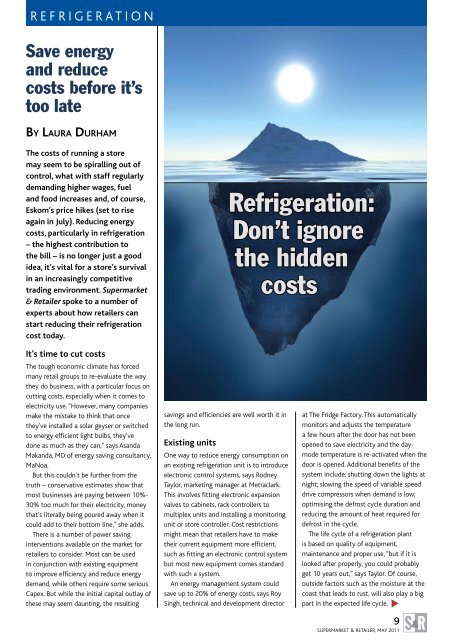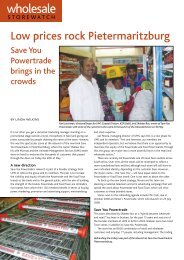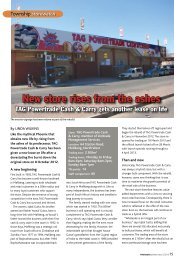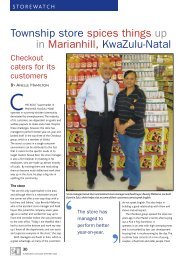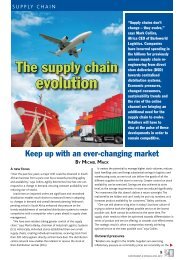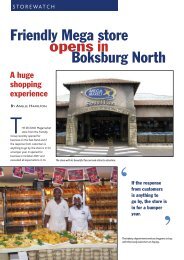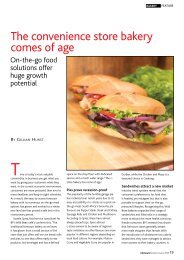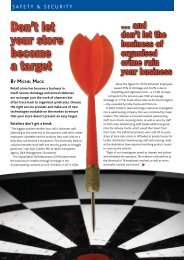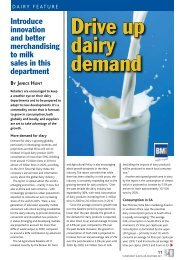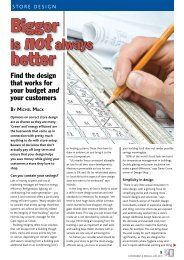Refrigeration - Supermarket.co.za
Refrigeration - Supermarket.co.za
Refrigeration - Supermarket.co.za
Create successful ePaper yourself
Turn your PDF publications into a flip-book with our unique Google optimized e-Paper software.
REFRIGERATION<br />
Save energy<br />
and reduce<br />
<strong>co</strong>sts before it’s<br />
too late<br />
By La u r a Du r h a m<br />
The <strong>co</strong>sts of running a store<br />
may seem to be spiralling out of<br />
<strong>co</strong>ntrol, what with staff regularly<br />
demanding higher wages, fuel<br />
and food increases and, of <strong>co</strong>urse,<br />
Eskom’s price hikes (set to rise<br />
again in July). Reducing energy<br />
<strong>co</strong>sts, particularly in refrigeration<br />
– the highest <strong>co</strong>ntribution to<br />
the bill – is no longer just a good<br />
idea, it’s vital for a store’s survival<br />
in an increasingly <strong>co</strong>mpetitive<br />
trading environment. <strong>Supermarket</strong><br />
& Retailer spoke to a number of<br />
experts about how retailers can<br />
start reducing their refrigeration<br />
<strong>co</strong>st today.<br />
<strong>Refrigeration</strong>:<br />
Don’t ignore<br />
the hidden<br />
<strong>co</strong>sts<br />
It’s time to cut <strong>co</strong>sts<br />
The tough e<strong>co</strong>nomic climate has forced<br />
many retail groups to re-evaluate the way<br />
they do business, with a particular focus on<br />
cutting <strong>co</strong>sts, especially when it <strong>co</strong>mes to<br />
electricity use. “However, many <strong>co</strong>mpanies<br />
make the mistake to think that once<br />
they’ve installed a solar geyser or switched<br />
to energy efficient light bulbs, they’ve<br />
done as much as they can,” says Asanda<br />
Makanda, MD of energy saving <strong>co</strong>nsultancy,<br />
MaNoa.<br />
But this <strong>co</strong>uldn’t be further from the<br />
truth – <strong>co</strong>nservative estimates show that<br />
most businesses are paying between 10%-<br />
30% too much for their electricity, money<br />
that’s literally being poured away when it<br />
<strong>co</strong>uld add to their bottom line,” she adds.<br />
There is a number of power saving<br />
interventions available on the market for<br />
retailers to <strong>co</strong>nsider. Most can be used<br />
in <strong>co</strong>njunction with existing equipment<br />
to improve efficiency and reduce energy<br />
demand, while others require some serious<br />
Capex. But while the initial capital outlay of<br />
these may seem daunting, the resulting<br />
savings and efficiencies are well worth it in<br />
the long run.<br />
Existing units<br />
One way to reduce energy <strong>co</strong>nsumption on<br />
an existing refrigeration unit is to introduce<br />
electronic <strong>co</strong>ntrol systems, says Rodney<br />
Taylor, marketing manager at Metraclark.<br />
This involves fitting electronic expansion<br />
valves to cabinets, rack <strong>co</strong>ntrollers to<br />
multiplex units and installing a monitoring<br />
unit or store <strong>co</strong>ntroller. Cost restrictions<br />
might mean that retailers have to make<br />
their current equipment more efficient,<br />
such as fitting an electronic <strong>co</strong>ntrol system<br />
but most new equipment <strong>co</strong>mes standard<br />
with such a system.<br />
An energy management system <strong>co</strong>uld<br />
save up to 20% of energy <strong>co</strong>sts, says Roy<br />
Singh, technical and development director<br />
at The Fridge Factory. This automatically<br />
monitors and adjusts the temperature<br />
a few hours after the door has not been<br />
opened to save electricity and the daymode<br />
temperature is re-activated when the<br />
door is opened. Additional benefits of the<br />
system include: shutting down the lights at<br />
night; slowing the speed of variable speed<br />
drive <strong>co</strong>mpressors when demand is low;<br />
optimising the defrost cycle duration and<br />
reducing the amount of heat required for<br />
defrost in the cycle.<br />
The life cycle of a refrigeration plant<br />
is based on quality of equipment,<br />
maintenance and proper use, “but if it is<br />
looked after properly, you <strong>co</strong>uld probably<br />
get 10 years out,” says Taylor. Of <strong>co</strong>urse,<br />
outside factors such as the moisture at the<br />
<strong>co</strong>ast that leads to rust, will also play a big<br />
part in the expected life cycle.<br />
▲<br />
9<br />
SUPERMARKET & RETAILER, MAY 2011


